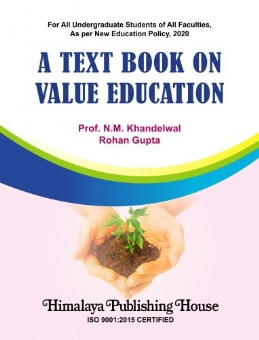A Text Book on Value Education
no information available
New Education Policy, 2020 emphasizes on Value Education (Human making education) based on our ancient cultural heritage. It also stresses on innovative pedagogy of self-exploration and self-validation based sustainable commitment of individual to practice chosen values at free will. The objective is to develop self-conscious, self-controlled citizens and professionals. The present book aims at catering the need arising from New Education Policy. It will be universally and eternally useful for students of undergraduate courses of all faculties and students of Technical and Professional Courses. It will also be useful for general readers. This book is divided into 5 units and 22 chapters related to Value Education, harmony of Individual, Family and Society relationships, harmony with nature, holistic understanding, and professional and technical ethics. It also contains further readings, MCQ tests with key and Subject Index. Size is about 230 pages. Salient Features - - Easy-to-understand lucid conversational style. - Every chapter contains Learning Objectives, Structure, Summary, - Key Words, Self-test questions and practice assignments. - Mandations, preachings, directions, dogmas and unfounded beliefs are avoided. - Daily life examples are used to illustrate key concepts encouraging learners to raise queries and join debates, and undertake self-experiments while making free choice of Values. Contents - Unit 1: Value Education 1. Value Education 2. Process of Value Education (Self-exploration) 3. Purpose of Life 4. Ethics, Ethos, Values and Skills 5. Material Needs vs. Relationships 6. Current Scenario of Material Status and Happiness Unit 2: Harmony of Individual 7. I (Soul) and My (Body) Coexistence 8. More about Needs of I (Soul) and My (Body) 9. My (Body) as Instrument of I (Soul) 10. Harmony in I (Soul) 11. Harmony of I (Soul) with My (Body) 12. Swasthya through Sanyam Unit 3: Family and Society Relations 13. Family Relationship 14. Values in Inter-human Relations (Family and Society Relations) 15. Social Harmony 16. Non-violent Communication Unit 4: Harmony in Existence 17. Harmony in Nature 18. Co-existence at All Levels Unit 5: Holistic Understanding and Professional and Technical Ethics 19. Natural Acceptance 20. Vision for Human Order 21. Commitment to Professional Ethics 22. Use of Holistic Technologies and Management Appendices ... Read more Read less











